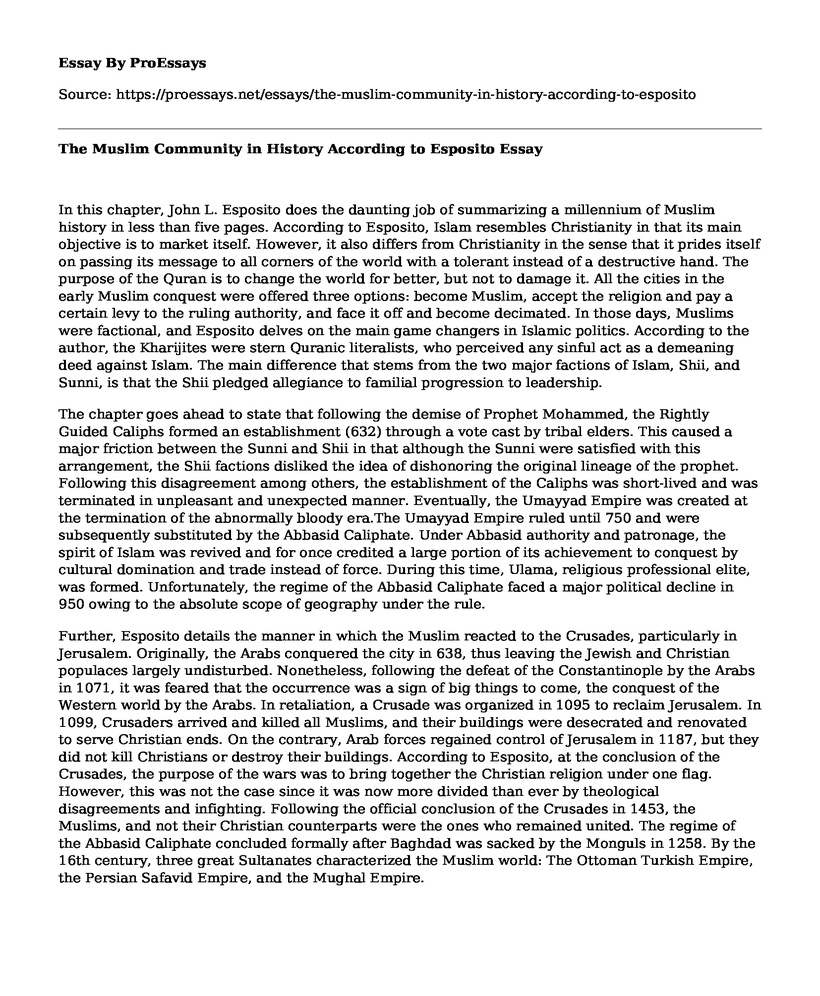In this chapter, John L. Esposito does the daunting job of summarizing a millennium of Muslim history in less than five pages. According to Esposito, Islam resembles Christianity in that its main objective is to market itself. However, it also differs from Christianity in the sense that it prides itself on passing its message to all corners of the world with a tolerant instead of a destructive hand. The purpose of the Quran is to change the world for better, but not to damage it. All the cities in the early Muslim conquest were offered three options: become Muslim, accept the religion and pay a certain levy to the ruling authority, and face it off and become decimated. In those days, Muslims were factional, and Esposito delves on the main game changers in Islamic politics. According to the author, the Kharijites were stern Quranic literalists, who perceived any sinful act as a demeaning deed against Islam. The main difference that stems from the two major factions of Islam, Shii, and Sunni, is that the Shii pledged allegiance to familial progression to leadership.
The chapter goes ahead to state that following the demise of Prophet Mohammed, the Rightly Guided Caliphs formed an establishment (632) through a vote cast by tribal elders. This caused a major friction between the Sunni and Shii in that although the Sunni were satisfied with this arrangement, the Shii factions disliked the idea of dishonoring the original lineage of the prophet. Following this disagreement among others, the establishment of the Caliphs was short-lived and was terminated in unpleasant and unexpected manner. Eventually, the Umayyad Empire was created at the termination of the abnormally bloody era.The Umayyad Empire ruled until 750 and were subsequently substituted by the Abbasid Caliphate. Under Abbasid authority and patronage, the spirit of Islam was revived and for once credited a large portion of its achievement to conquest by cultural domination and trade instead of force. During this time, Ulama, religious professional elite, was formed. Unfortunately, the regime of the Abbasid Caliphate faced a major political decline in 950 owing to the absolute scope of geography under the rule.
Further, Esposito details the manner in which the Muslim reacted to the Crusades, particularly in Jerusalem. Originally, the Arabs conquered the city in 638, thus leaving the Jewish and Christian populaces largely undisturbed. Nonetheless, following the defeat of the Constantinople by the Arabs in 1071, it was feared that the occurrence was a sign of big things to come, the conquest of the Western world by the Arabs. In retaliation, a Crusade was organized in 1095 to reclaim Jerusalem. In 1099, Crusaders arrived and killed all Muslims, and their buildings were desecrated and renovated to serve Christian ends. On the contrary, Arab forces regained control of Jerusalem in 1187, but they did not kill Christians or destroy their buildings. According to Esposito, at the conclusion of the Crusades, the purpose of the wars was to bring together the Christian religion under one flag. However, this was not the case since it was now more divided than ever by theological disagreements and infighting. Following the official conclusion of the Crusades in 1453, the Muslims, and not their Christian counterparts were the ones who remained united. The regime of the Abbasid Caliphate concluded formally after Baghdad was sacked by the Monguls in 1258. By the 16th century, three great Sultanates characterized the Muslim world: The Ottoman Turkish Empire, the Persian Safavid Empire, and the Mughal Empire.
Cite this page
The Muslim Community in History According to Esposito. (2021, Apr 05). Retrieved from https://proessays.net/essays/the-muslim-community-in-history-according-to-esposito
If you are the original author of this essay and no longer wish to have it published on the ProEssays website, please click below to request its removal:
- Unity, Relativity and Exclusivity in Christianity
- The Gilded Age Tycoon's And the Progressive Movement: Essay Sample
- Book of Esther is in the Old Testament of the Bible: Research Paper
- Paper Example on Theories of Kant and Spinoza
- Criminal Investigation on the War Crime Paper Example
- Essay Example on South Korea-North Korea Relations: Consequences of the Korean War
- Essay Sample on Alexander Hamilton: Orphan to Right-Hand Man







